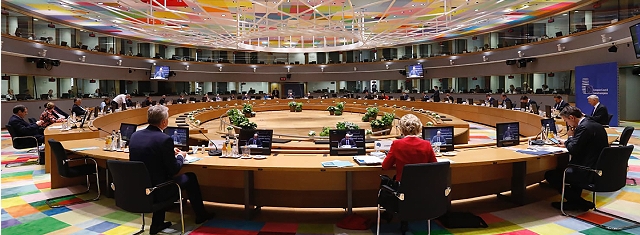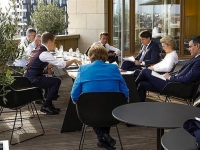Politics
European leaders reach historic agreement on budget and for recovery
They will invest 1,074 billion euros

(Source: Pool European Council)
USPA NEWS -
“We have reached a deal on the recovery package and the European budget. These were, of course, difficult negotiations in very difficult times for all Europeans. A marathon which ended in success for all 27 member states, but especially for the people. This is a good deal. This is a strong deal. And most importantly, this is the right deal for Europe, right now.“ These are the words of the President of the European Council, Charles Michel, after 90 hours of negotiations that ended at dawn on Tuesday with a historic agreement for Europe: the approval of the Community budget for the period 2021-2027 and the creation of a package of Aid to the countries most affected by the Coronavirus pandemic.
Finally, 'The 27' reached an agreement that will distribute 1,074 billion euros until 2027 to modernize Europe, deepen the digitization of the continent and launch the green transition. It is an ambitious plan, despite the fact that Europe loses one of its main contributors for Brexit. It is not as ambitious as the countries of the South wanted - Spain and Italy, above all - but it is more ambitious than the so-called "frugal countries;" those of Northern Europe, which have made it extremely difficult to approve the budget and the recovery from the pandemic.
But, in exchange for the 1,074 billion, 'The 27' have had to accept that there will be inevitable reductions in the Common Agrarian Policy (CAP) and in the Cohesion Fund. It is the cession of the Southern countries for the sake of the agreement. As the President of the Spanish Government, Pedro Sánchez, said after the Council, "Europe had to reach an agreement in July. And Europe has reached an agreement. It has been a difficult negotiation, in which we have been involved for some extraordinarily complicated months and with a strenuous and successful final stretch, as successful as it is strenuous. Europe was facing a historic challenge and has known how to respond with a historic agreement," Sánchez said at the end of the Summit.
The agreement is made up of a large € 750 billion Recovery Fund, called "Next Generation EU". The objective of the Fund is to mobilize a massive amount of European public resources so that the recovery, after the COVID-19 crisis, is as soon and strong as possible. A recovery that must be sustained on three pillars that allow for strong, balanced and sustainable growth: the digital transition, the ecological transition and the training of students and workers. In short: a green, digital recovery and the improvement of human capital, for a competitive, inclusive and sustainable economy.
Of the € 750 billion in "Next Generation EU", € 360 billion will be dedicated to loans and € 390 billion to transfers, to be made based on the impact of the pandemic. In order to mobilize all those resources, which represent the equivalent of 4.6% of the 2019 European Gross Domestic Product (GDP), the European Commission will borrow for the first time in history to finance programs. It is a giant step in European construction, in keeping with the magnitude of the economic and social crisis caused by COVID-19.
The approval of the cohesion funds in the 1990s gave a boost to European integration and had a great role in the economic development of several countries of the Union. "If the cohesion fund represented for Spain the equivalent of about 7,800 million euros then for a period of six years, what we have approved today means almost 73,000 million euros for our country: almost 10 times the size of those funds of cohesion, which were so important for the progress and prosperity of all Spaniards," Sánchez explained.
This extraordinary boost in resources pooled by the European Union to make the economies stronger, greener and more modern completes what the European budget already does in other central areas of European policy, such as Agricultural Policy or cohesion, which have once again demonstrated their essential role during the pandemic.
Liability for this article lies with the author, who also holds the copyright. Editorial content from USPA may be quoted on other websites as long as the quote comprises no more than 5% of the entire text, is marked as such and the source is named (via hyperlink).






